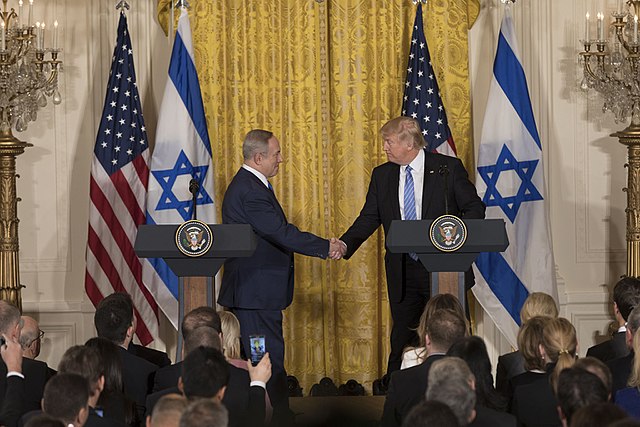Israel and Palestine have been in a brutal skirmish over territory, religion, ethnicity, and the basic tenet of identity, since 1948. With arguments stemming from Biblical times, both the parties have seen a shift in the protracted conflict, ranging from full blown conventional war to hybrid asymmetrical conflict, in recent time, putting human security at both the sides at grave risk. Major peace deals between the two parties, mostly initiated by the US have been tabled amid widespread speculations and positivity in the past, and they have failed. How Trump’s peace proposal, which has signs of preliminary selective bias against the Palestinians will be any different is a thing to look out for in the near future.
US Vice President Mike Pence and Israel’s interim Prime Minister Benjamin Netanyahu met in the newly established, and much controversial US embassy in Jerusalem. Vice President Pence on behalf of Trump saw this as an wonderful opportunity and decided to invite Prime Minister Netanyahu to the White House in Washington D.C. to discuss the much speculated Mideast Peace Plan between Israel and Palestine, over the Palestine question, which in Trumpian lingo is now deemed as “The Deal of the Century”.
This would be one of the few times in Israel-US-Palestine’s triangular history where Israel as a majorly contested state actor will recognize the Palestinian Authority as a state actor in an international tripartite peace talk, which they will strictly refuse to do so in any other formal day. This might also come up as the fourth conclusive and much-awaited peace talks after The Camp David Accords in 1978, and the Oslo Accords I and II in 1993 and 1995 respectively. In fact, in both the previous talks, it was the US that played a significant role as a third-party negotiator. Surprisingly, Netanyahu, who previously was seen as a leader keen on seeking distinct attention through his flamboyant, dramatic persona in talks, international seminaries, and meetings has also taken this opportunity to invite his main political rival, and Prime Minister hopeful Benny Gantz to be a part of this historic peace deal. Benny Gantz, the former Chief of General Staff of the Israel Defense Forces and the founding leader of the Blue and White political party has been responsible for challenging Netanyahu’s supremacy in the Israeli general elections twice and has pushed for Netanyahu’s indictment on the recent charges of bribery, fraud, and breach of trust. This gesture from Netanyahu to extend an invitation to Gantz can very well be an opportunity to earn Gantz’s patronage and trust, in an attempt to secure his Prime Ministerial position in March 2020, for the third time in one year, which have failed disastrously in the previous two elections due to lack of secure coalitions.
However, keeping the internal political dissonance aside, the major concern in the peace talk lies in Israel’s and US’s preconditions, before they can come to the same page with the Palestinian Authority before the actual talk. These preconditions threaten to make the peace agreement biased and selective, making it tilt towards the Israeli-US narrative, much to the dismay of the Palestinian Authority and the greater Arab world. Some of those preconditions include:
1) Palestinian Authority to recognize Israel as a legitimate country, and a homeland for the Jewish People as iterated in the symbolic and declarative Israel’s Basic Law of 2018.
2) Complete demilitarization of Hamas and Fatah in Gaza and West Bank (Judea and Samaria).
3) Recognition of Israel’s sovereignty over undivided Jerusalem as the capital of Israel, with a huge symbolic presence, as iterated in quasi-constitutional Israel’s Basic Law of 1980.
4) Recognition of Part C (as per the Oslo Accords I and II) in West Bank (Judea and Samaria) as legitimate Israeli territory, with pockets of open land access for Palestinians.
5) US and Palestinian recognition of Israel’s sovereignty over the Jordan Valley.
6) Palestinian Authority to lose complete authority over Border Control, and control only 30% of remaining Part A and B (as per the Oslo Accords I and II) in West Bank (Judea and Samaria).
It is reported that Vice President Pence on behalf of President Trump has agreed to most of the demands laid out by the Israeli side, as a peace negotiator, and it should be no surprise since President Trump’s unequivocal support for Israel, and his distinct bonhomie with Prime Minister Netanyahu has changed the picture of the protracted conflict in the near past, most recent being the recognition of undivided Jerusalem as the Israeli capital and the subsequent shifting of US embassy to Jerusalem. It is now left to see as to how this biased and selective peace deal goes down the throat of the representatives of the Palestinian Authority, who have already threatened Israel after Pence and Netanyahu’s meeting to not cross the red line.
In the end, one can very well notice that almost all or most of the issues laid out as preconditions from the Israeli side to come to the discussion table with the Palestinian Authority are actually the very main and foundational crux of the Israel-Arab and Israel-Palestine conflict, brewing since 1948. Coercing it down on the people and authority of Palestine for a selective and uncertain vision of peace and stability can be deemed as a grave mistake, since the preconditions are exactly what the Palestinian state, both in Gaza Strip and West Bank (Judea and Samaria) are fighting against, forget reaching a consensus in the peace deal. It is also speculated in the Israeli security and military academia, that if coerced to accept the peace deal, Israel might very well be prepared to go for a Second Gaza War.
It seems botched, it seems motivated, and it surely is tilted towards Israel’s benefit, unsurprisingly. What is left of it is to see how the Palestinian Authority walks away from the table. And if they do not, how do they circumnavigate this bilaterally planned checkmate.
The views and opinions expressed in this article are those of the author and do not necessarily reflect the official policy or position of The Geopolitics.

Author is an alumnus of the prestigious School of International Affairs at O.P. Jindal Global University – India. He has completed his master’s in Diplomacy, Law, and Business with a specialisation in Conflict and Peace Studies.


